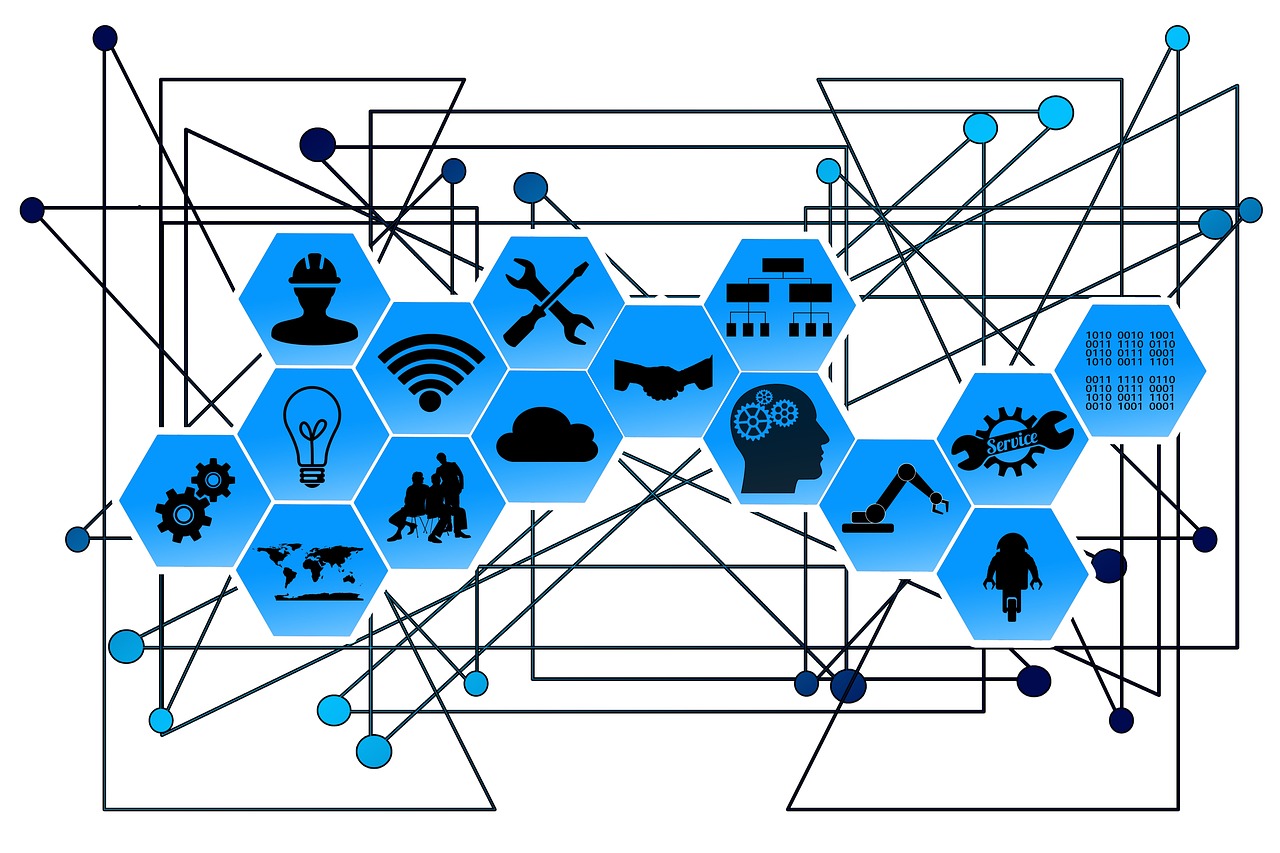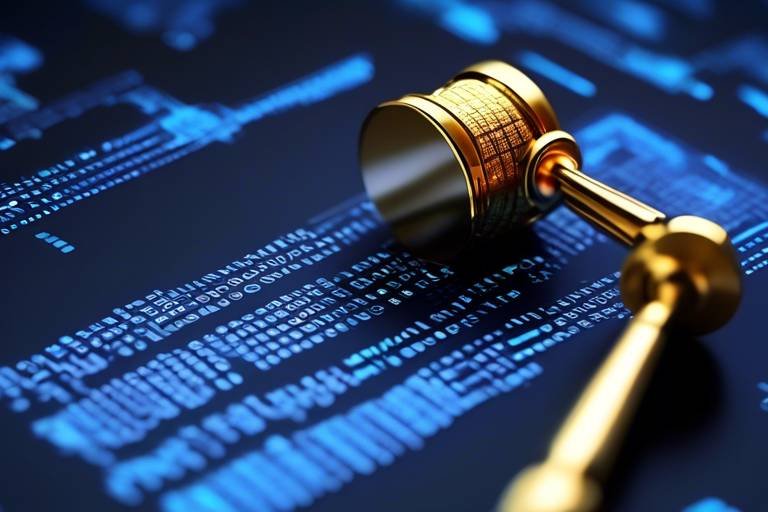The Rise of Blockchain-Based Voting Systems
In recent years, the conversation around voting systems has taken a dramatic turn, thanks to the advent of blockchain technology. This innovative approach is not just a buzzword; it represents a fundamental shift in how we think about elections and the integrity of our democratic processes. Imagine a world where your vote is not only counted but also securely recorded in an immutable ledger that anyone can verify. Sounds like something out of a science fiction novel, right? Yet, this is the reality that blockchain-based voting systems are striving to achieve.
As we dive deeper into this topic, we'll explore how blockchain technology is reshaping the electoral landscape, making it more transparent, secure, and accessible for everyone. The potential benefits are enormous, but so are the challenges. Just like any emerging technology, blockchain in voting comes with its own set of hurdles that we need to address. So, buckle up as we embark on this fascinating journey through the rise of blockchain-based voting systems.
To fully grasp the implications of blockchain in voting, we first need to understand what blockchain is. At its core, blockchain is a decentralized digital ledger that records transactions across many computers in such a way that the registered transactions cannot be altered retroactively. This characteristic of immutability is what makes blockchain particularly appealing for voting systems. Each vote can be recorded as a transaction in the blockchain, ensuring that once it's cast, it cannot be changed or tampered with.
Moreover, blockchain operates on a network of nodes, each holding a copy of the entire blockchain. This decentralization means that there is no single point of failure, making it incredibly difficult for hackers to manipulate the voting process. Imagine trying to change the outcome of an election when every vote is securely locked away in multiple locations across the globe. It's a daunting task, to say the least!
So, what makes blockchain voting systems so appealing? Let's break down the key benefits:
- Increased Security: With the use of cryptographic algorithms, blockchain voting provides enhanced security measures that protect against fraud and cyberattacks.
- Transparency: Every transaction is recorded on the blockchain and can be audited by anyone, ensuring that the voting process is transparent and accountable.
- Accessibility: Blockchain voting can be accessed remotely, making it easier for people with disabilities or those living abroad to participate in elections.
These benefits could revolutionize the electoral process, instilling greater confidence in voters and encouraging higher turnout rates. After all, when people feel secure in the knowledge that their vote counts and is accurately recorded, they’re more likely to engage in the democratic process.
When it comes to elections, security is non-negotiable. The cryptographic features of blockchain ensure that each vote is securely encrypted, making it nearly impossible for anyone to alter or duplicate a vote. Imagine a fortress protecting your vote—this is what blockchain achieves through its complex algorithms and encryption techniques.
One of the standout features of blockchain is its decentralization. By eliminating single points of failure, it becomes significantly harder for malicious actors to manipulate results. Think of it like a multi-headed hydra; cut off one head, and two more grow back. This resilience makes blockchain an attractive option for securing elections.
Another crucial aspect of voting is voter anonymity. Voters want to know that their choices remain private. Blockchain technology can ensure this anonymity while still allowing for verifiable and transparent voting. It’s like casting your vote in a sealed envelope that only you can open, ensuring your choice remains confidential yet accountable.
Despite its promising features, blockchain voting systems are not without challenges. Issues such as technological literacy, the digital divide, and regulatory hurdles must be addressed. For instance, not everyone has access to the necessary technology or the know-how to navigate a blockchain voting system. Additionally, legal frameworks need to evolve to accommodate this new voting method.
Several countries and organizations have begun experimenting with blockchain voting, leading to exciting case studies that provide insight into its practical applications. For example, in 2020, Utah County in the United States allowed overseas voters to cast their ballots using a blockchain-based system. The results were promising, showcasing the potential for increased voter participation and security.
Examining various international implementations of blockchain voting reveals both successes and lessons learned. For instance, Estonia has been a pioneer in digital voting, implementing blockchain technology to secure its electoral processes. Their experience offers valuable insights into the scalability and reliability of blockchain voting systems.
The future of blockchain in voting systems holds great promise. Innovations such as smart contracts could automate the voting process, further enhancing efficiency and security. As technology evolves, we may find ourselves in a world where blockchain voting becomes the norm, fostering greater trust in elections and encouraging civic engagement.
- What is blockchain voting? Blockchain voting utilizes blockchain technology to securely and transparently record votes in an election.
- How does blockchain ensure security? Blockchain employs cryptographic algorithms and decentralization to protect against fraud and tampering.
- Are there any real-world examples of blockchain voting? Yes, countries like Estonia and regions like Utah County have implemented blockchain voting systems with promising results.

Understanding Blockchain Technology
Blockchain technology serves as the backbone of decentralized systems, fundamentally transforming how we perceive and conduct transactions. Imagine a digital ledger that is not only secure but also transparent, where every transaction is recorded in a way that cannot be altered retroactively. This is the essence of blockchain. At its core, blockchain is a distributed database that maintains a continuously growing list of records, known as blocks, which are linked and secured using cryptography. Each block contains a timestamp, transaction data, and a cryptographic hash of the previous block, creating a chain of blocks—hence the name blockchain.
One of the most compelling features of blockchain technology is its decentralization. Unlike traditional systems that rely on a central authority, blockchain operates on a peer-to-peer network. This means that no single entity has control over the entire network, making it resistant to manipulation and fraud. In the context of voting systems, this decentralization ensures that the integrity of the electoral process is maintained, as the data is distributed across numerous nodes. Each participant in the network has access to the same information, which enhances transparency and trust among voters.
Moreover, blockchain technology employs advanced cryptographic techniques to secure transactions. Every transaction is encrypted, and only authorized users can access the data. This level of security is crucial in voting systems, where the stakes are high and the potential for fraud is significant. By leveraging cryptography, blockchain voting systems can provide a secure environment where votes are cast and counted without the risk of tampering.
To further illustrate the capabilities of blockchain, let's consider its key features:
- Immutability: Once a transaction is recorded on the blockchain, it cannot be changed or deleted, ensuring the integrity of the voting process.
- Transparency: All transactions are visible to participants in the network, fostering trust and accountability.
- Security: Advanced cryptographic techniques protect against unauthorized access and fraud.
- Decentralization: Eliminates single points of failure, making it difficult for malicious actors to manipulate results.
As we delve deeper into the potential of blockchain in voting systems, it becomes clear that understanding its foundational principles is essential. The technology not only enhances security and transparency but also paves the way for more accessible voting processes. With the ability to verify identities while maintaining voter anonymity, blockchain could revolutionize how we conduct elections in the future.

Benefits of Blockchain Voting
The advent of blockchain technology in voting systems is nothing short of a revolution. Imagine a world where every vote is securely recorded and easily verifiable, eliminating the age-old fears of fraud and manipulation. Blockchain voting offers a plethora of advantages that can fundamentally transform the electoral process. By harnessing this innovative technology, we can enhance security, transparency, and accessibility in elections, which are crucial for boosting voter confidence and participation.
First and foremost, one of the standout features of blockchain voting is its enhanced security measures. Traditional voting systems are often vulnerable to various threats, including hacking, ballot tampering, and even physical fraud. However, blockchain employs advanced cryptographic techniques that create a robust defense against these risks. Each vote is encrypted and linked to a unique digital signature, making it nearly impossible for malicious actors to alter or forge votes without detection. This level of security not only protects the integrity of the election but also instills trust among voters, knowing their choices are safe.
Moreover, the decentralization aspect of blockchain technology plays a pivotal role in enhancing security. In conventional systems, central databases can become prime targets for cyberattacks. However, blockchain operates on a distributed network of nodes, which means that there is no single point of failure. This decentralization significantly complicates the efforts of those attempting to manipulate election outcomes. Each node maintains a copy of the entire blockchain, so any attempt to alter the results would require the consensus of the majority of the network, making it a formidable challenge for any potential fraudster.
Another critical benefit of blockchain voting is the assurance of voter anonymity. Privacy is a cornerstone of democratic processes, and voters must feel confident that their choices remain confidential. Blockchain technology can provide this anonymity while still allowing for transparency. By using sophisticated algorithms, blockchain can ensure that while votes are recorded on the public ledger, the identities of the voters are kept private. This dual capability reassures voters that their preferences are protected, yet the system remains open to verification by independent observers.
Furthermore, the accessibility of blockchain voting systems can significantly increase voter turnout, especially among populations that may struggle with traditional voting methods. Imagine a scenario where individuals can cast their votes from the comfort of their homes using secure mobile applications. This convenience can be particularly beneficial for people with disabilities, those living in remote areas, or even expatriates who wish to participate in their home country's elections. By removing barriers to participation, blockchain voting can lead to a more representative democracy.
In summary, the benefits of blockchain voting are manifold. From enhanced security and decentralization to voter anonymity and increased accessibility, this technology presents a promising solution to many of the challenges faced by traditional electoral systems. As we look to the future, it is essential to consider how these advantages can be harnessed to create a more trustworthy and inclusive voting process.
- What is blockchain voting? Blockchain voting is a secure method of casting votes using blockchain technology, which ensures transparency and integrity in the electoral process.
- How does blockchain enhance security in voting? Blockchain uses cryptographic techniques to secure each vote, making it difficult for fraud or manipulation to occur.
- Can voters remain anonymous using blockchain voting? Yes, blockchain technology can ensure voter anonymity while still allowing for the verification of votes.
- Will blockchain voting increase voter turnout? By providing more accessible voting options, such as online voting, blockchain can potentially increase participation among various demographics.

Enhanced Security Measures
Security is the cornerstone of any electoral process, and the introduction of blockchain technology brings a revolutionary approach to safeguarding votes. Imagine a world where every vote cast is not only counted but is also protected by robust cryptographic measures that ensure its integrity. This is the promise of blockchain voting systems. By leveraging the inherent characteristics of blockchain, we can significantly reduce the risks associated with fraud and cyberattacks. Each vote is recorded as a unique transaction on a decentralized ledger, making it nearly impossible for malicious actors to alter or delete any entry.
One of the standout features of blockchain technology is its use of cryptography. Each transaction is encrypted and linked to the previous transaction, creating a secure chain that is resistant to tampering. This means that even if a hacker were to gain access to the system, they would face an uphill battle trying to manipulate the data. The cryptographic algorithms used in blockchain voting systems ensure that the votes remain confidential yet verifiable, providing a dual layer of security.
Moreover, the decentralized nature of blockchain eliminates single points of failure. Traditional voting systems often rely on centralized databases, which can be vulnerable to attacks. In contrast, a blockchain-based voting system distributes the data across a network of computers, making it significantly harder for any one entity to control or corrupt the system. This decentralization is akin to having multiple locks on a door; even if one lock is compromised, the others remain secure.
Another critical aspect of enhanced security in blockchain voting is voter anonymity. In today's digital age, concerns about privacy are paramount. Voters want to ensure that their choices remain confidential, and blockchain technology can provide this assurance. By utilizing advanced cryptographic techniques, blockchain can anonymize voter identities while still ensuring that each vote is accounted for. This balance between anonymity and transparency is crucial in building trust in the electoral process.
In summary, the enhanced security measures offered by blockchain technology represent a significant leap forward in the quest for secure and trustworthy elections. With cryptographic protections, decentralized networks, and a commitment to voter privacy, blockchain voting systems not only safeguard the integrity of the electoral process but also bolster public confidence in democratic institutions. As we look to the future, it’s clear that these technological advancements could redefine how we approach voting and ensure that every voice is heard and protected.
- What is blockchain technology?
Blockchain is a decentralized digital ledger that records transactions across multiple computers. This ensures that the data is secure and cannot be altered retroactively. - How does blockchain enhance voting security?
Blockchain enhances voting security through cryptographic measures, decentralization, and the ability to maintain voter anonymity while ensuring transparency. - Are there any real-world examples of blockchain voting?
Yes, several countries and organizations have experimented with blockchain voting systems, yielding valuable insights into their effectiveness and potential challenges. - What challenges do blockchain voting systems face?
Challenges include technological barriers, public skepticism, and the need for comprehensive regulations to govern their use.

Decentralization and Its Impact
Decentralization is a game-changer in the realm of voting systems, fundamentally altering how we perceive and conduct elections. Imagine a world where no single entity holds the keys to the voting process, where power is distributed among the masses rather than concentrated in a central authority. This is the essence of blockchain technology, and its impact on voting cannot be overstated. By removing single points of failure, decentralization not only enhances security but also fosters trust among voters.
When we think about traditional voting systems, they often rely on centralized databases and authorities, making them vulnerable to manipulation and fraud. In contrast, blockchain's decentralized nature means that every transaction—every vote—is recorded across a network of computers, or nodes. This redundancy ensures that even if one node is compromised, the overall integrity of the system remains intact. It's like having multiple copies of a priceless painting scattered across different galleries; even if one is damaged, the others preserve the original's value.
Moreover, decentralization encourages transparency. Voters can verify that their votes have been counted correctly without needing to trust a single authority. This transparency is vital for building public confidence in electoral outcomes. In a decentralized voting system, every participant can access the same information, leading to a collective assurance that the process is fair and just. This level of openness can significantly reduce allegations of fraud, as the evidence lies in the blockchain itself, immutable and accessible to all.
However, while decentralization presents numerous benefits, it also comes with its own set of challenges. For instance, the technology behind blockchain can be complex, and not all voters may be tech-savvy enough to navigate it. Additionally, the need for a robust internet connection can pose accessibility issues in certain regions. Therefore, while decentralization is a powerful tool for enhancing the electoral process, it is essential to ensure that all voters are equipped and educated to participate fully in this new landscape.
In summary, decentralization profoundly impacts voting systems by enhancing security, fostering transparency, and building public trust. As we move toward a future where blockchain technology becomes more prevalent in electoral processes, addressing the challenges of accessibility and education will be crucial. The promise of a fairer, more secure voting system is within reach, and decentralization is leading the way.
- What is blockchain technology? Blockchain is a decentralized digital ledger that records transactions across multiple computers, ensuring security and transparency.
- How does decentralization improve voting security? By distributing the voting data across a network, decentralization reduces the risk of manipulation and fraud, as there is no single point of failure.
- Can blockchain voting ensure voter anonymity? Yes, blockchain technology can maintain voter privacy while allowing for transparent and verifiable voting processes.
- What challenges do blockchain voting systems face? Key challenges include technological complexity, the need for internet access, and ensuring voter education and accessibility.

Voter Anonymity
When it comes to voting, anonymity is not just a luxury; it's a fundamental right. Imagine standing in a crowded room, filled with people who have differing opinions, and casting your vote in complete silence. This is what voter anonymity provides—a shield that allows individuals to express their choices without fear of backlash or judgment. In the context of blockchain technology, this anonymity is achieved through sophisticated cryptographic methods that ensure that while votes are recorded transparently, the identity of the voter remains concealed.
One of the most significant advantages of blockchain voting systems is their ability to maintain this balance between transparency and privacy. Voters can verify that their votes were counted without revealing their identities. This is made possible through a combination of public and private keys, where the public key acts as an identifier for the vote, while the private key keeps the voter's identity hidden. This ensures that even if someone were to access the blockchain, they would see the votes but not the individuals behind them.
Moreover, the use of blockchain technology can significantly reduce the risk of voter coercion. In traditional voting systems, there can be instances where individuals are pressured to vote in a particular way, either by employers, family members, or even political groups. With blockchain, the cryptographic features ensure that no one can trace back to how a person voted, thus empowering voters to make decisions based solely on their beliefs and preferences.
However, achieving true voter anonymity is not without its challenges. As with any technology, there are concerns regarding the potential for abuse. For instance, if someone were to gain unauthorized access to a voter's private key, they could potentially manipulate the voting process. Therefore, it is crucial for blockchain voting systems to incorporate robust security measures that protect these keys and ensure that only the rightful owner has access to them.
In conclusion, voter anonymity in blockchain voting systems is a game-changer. It not only protects the individual's right to vote freely but also enhances the overall integrity of the electoral process. As we look towards the future of voting technology, ensuring that voter anonymity remains a priority will be essential in building trust and encouraging participation in elections.
- How does blockchain ensure voter anonymity? Blockchain uses cryptographic techniques that allow votes to be recorded without revealing the voter's identity.
- What are the risks associated with voter anonymity in blockchain voting? The main risk involves unauthorized access to private keys, which could compromise the integrity of the voting process.
- Can voters verify their votes without compromising their anonymity? Yes, voters can verify that their votes were counted through the use of public keys without revealing their identity.

Challenges and Limitations
While the potential of blockchain voting systems is undeniably exciting, there are several challenges and limitations that must be addressed to ensure their successful implementation. One of the primary concerns is the technological barrier that exists in many regions. Not everyone has access to the necessary technology or the internet, which could disenfranchise voters who are not tech-savvy or do not have reliable connectivity. This is particularly problematic in rural or underdeveloped areas, where technology infrastructure may still be lacking.
Another significant challenge is the regulatory landscape. Governments and electoral bodies must navigate a complex web of laws and regulations when considering the adoption of blockchain voting. Many jurisdictions may not have clear guidelines on how to implement such systems, leading to potential legal challenges. Moreover, the lack of standardized protocols can create confusion and hinder the widespread acceptance of blockchain technology in elections.
Additionally, the security of the technology itself is a concern. Although blockchain is often touted for its security features, it is not entirely immune to attacks. Cybersecurity threats are evolving, and malicious actors are always looking for vulnerabilities to exploit. For instance, if a blockchain voting system is not properly configured or maintained, it could become a target for hackers. The integrity of the voting process relies heavily on the security of the technology used.
Moreover, there is a trust issue that needs to be addressed. Many voters may feel skeptical about using a new technology for something as critical as voting. Trust in the electoral process is paramount, and if voters do not feel confident in the security and reliability of blockchain voting, they may be reluctant to participate. Building this trust will require extensive public education about how blockchain works and its benefits over traditional voting methods.
Lastly, the cost of implementation can be a significant barrier. Developing and deploying a blockchain voting system requires substantial financial investment. This includes not only the technology itself but also the training of election officials and public outreach to educate voters. For some governments, especially those with limited budgets, the cost may outweigh the perceived benefits.
In summary, while blockchain voting systems offer a promising future for electoral processes, overcoming these challenges is crucial. Addressing technological barriers, regulatory issues, security concerns, trust deficits, and financial constraints will be essential for the successful integration of blockchain into voting systems. Without careful consideration and planning, the potential benefits of this innovative technology could remain unrealized.
- What are the main benefits of blockchain voting? Blockchain voting can enhance security, transparency, and accessibility, thereby increasing voter confidence in the electoral process.
- How does blockchain ensure voter anonymity? Blockchain technology employs cryptographic methods that allow for secure voting while maintaining the privacy of individual voters.
- What are the risks associated with blockchain voting? Risks include technological barriers, regulatory challenges, cybersecurity threats, trust issues, and implementation costs.
- Are there any countries currently using blockchain for voting? Yes, several countries have begun experimenting with blockchain voting, and there are notable case studies demonstrating its application.

Real-World Applications
As the world increasingly embraces technology, blockchain voting systems are making their mark across various nations and organizations. This innovative approach to elections is not just theoretical; it has been put to the test in real-world scenarios, showcasing its potential to revolutionize the electoral process. For instance, countries like Estonia have been at the forefront, implementing e-voting solutions that utilize blockchain technology. This allows citizens to cast their votes securely from anywhere, which is particularly beneficial for those living abroad or in remote areas.
Another notable example is the United States, where several states have piloted blockchain-based voting initiatives. In 2020, Utah County experimented with a blockchain voting system for overseas voters, allowing them to submit their ballots securely. The pilot program was a success, demonstrating how blockchain can facilitate a more inclusive voting process while maintaining the integrity of the election.
Moreover, Switzerland has also ventured into blockchain voting, particularly in the city of Zug, known as "Crypto Valley." Here, residents have been able to participate in local elections using a blockchain-based voting system. This initiative not only enhances security but also boosts voter engagement by making the voting process more accessible.
To further illustrate the global landscape of blockchain voting, let's take a look at a table summarizing key case studies:
| Country | Implementation | Year | Outcome |
|---|---|---|---|
| Estonia | E-voting using blockchain | 2005 | High voter turnout, secure process |
| United States | Blockchain pilot for overseas voters | 2020 | Successful pilot, increased participation |
| Switzerland | Local elections in Zug | 2019 | Enhanced security and engagement |
These examples highlight how blockchain is not just a buzzword; it is becoming a viable solution for modern electoral systems. The real-world applications of blockchain voting are paving the way for a future where elections are not only more secure but also more accessible to the general public. As more countries and organizations experiment with this technology, we can expect to see an evolution in how we approach voting, ultimately leading to greater trust in electoral processes.
Q: What is blockchain voting?
A: Blockchain voting refers to the use of blockchain technology to conduct elections, ensuring security, transparency, and accessibility in the voting process.
Q: Is blockchain voting secure?
A: Yes, blockchain voting is designed to be secure due to its decentralized nature and cryptographic features, which protect against fraud and cyberattacks.
Q: How does blockchain ensure voter anonymity?
A: Blockchain technology can maintain voter privacy by using cryptographic techniques that allow votes to be verified without revealing the voter's identity.
Q: What are the challenges of implementing blockchain voting?
A: Challenges include technological barriers, legal regulations, and the need for public trust in the system.

Case Studies from Around the World
As the world increasingly embraces technology, several countries have ventured into the realm of blockchain-based voting systems. These pioneering efforts provide valuable insights into the practical applications and effectiveness of this innovative approach. One of the most notable examples comes from Estonia, which has been a trailblazer in digital governance. Since 2005, Estonia has allowed its citizens to vote online using a secure blockchain system. This initiative has not only increased voter participation but also demonstrated how blockchain can enhance the integrity of the electoral process. The Estonian model showcases the potential of blockchain to facilitate secure and transparent voting while maintaining a high level of accessibility.
Another significant case study is found in the United States, where various states have experimented with blockchain voting during local elections. For instance, in 2020, Utah County utilized a blockchain-based voting platform that allowed overseas voters to participate securely. The results were promising, as the system provided a seamless voting experience while ensuring that each vote was accurately recorded and verifiable. This experiment highlighted the potential for blockchain to address the challenges faced by absentee voters, particularly those serving in the military.
On the other side of the globe, Venezuela has also explored blockchain technology for electoral purposes. In their 2018 presidential election, the country implemented a blockchain-based system to enhance transparency and reduce allegations of fraud. Although the political climate in Venezuela is complex, the use of blockchain was intended to provide a tamper-proof record of votes. While the implementation faced criticism and skepticism, it nonetheless sparked discussions about the future of voting in regions plagued by electoral corruption.
To further illustrate the global landscape of blockchain voting, here’s a brief overview of some key case studies:
| Country | Year | Key Features | Outcome |
|---|---|---|---|
| Estonia | 2005 | Online voting, secure blockchain | Increased voter participation |
| United States (Utah County) | 2020 | Blockchain platform for overseas voters | Seamless voting experience |
| Venezuela | 2018 | Blockchain for transparency | Controversial implementation |
These case studies reveal a compelling narrative about the potential of blockchain technology in enhancing electoral processes. While each implementation comes with its unique challenges and outcomes, the overarching theme remains clear: blockchain has the capacity to revolutionize how we think about voting. As we continue to observe these developments, it's essential to learn from both the successes and the setbacks faced by these early adopters.
In conclusion, the journey toward blockchain-based voting systems is still in its infancy, but the lessons learned from these case studies provide a solid foundation for future innovations. The road ahead will require collaboration among governments, technology providers, and the public to ensure that the promise of secure, transparent, and accessible voting becomes a reality.
- What is blockchain voting? Blockchain voting refers to the use of blockchain technology to facilitate secure and transparent voting processes, allowing for verifiable and tamper-proof results.
- How does blockchain enhance security in voting? Blockchain employs cryptographic techniques that protect against fraud and unauthorized access, ensuring that votes are securely recorded and cannot be altered.
- Are there any successful implementations of blockchain voting? Yes, countries like Estonia and local jurisdictions in the United States have successfully implemented blockchain voting systems, demonstrating increased voter participation and security.
- What challenges do blockchain voting systems face? Challenges include technological barriers, public trust issues, regulatory hurdles, and the need for comprehensive education on how these systems work.

Future Prospects of Blockchain Voting
The future of blockchain voting is not just a distant dream; it is rapidly becoming a reality that could redefine how we engage with democracy. Imagine a world where casting your vote is as simple and secure as sending a text message. With the ongoing advancements in blockchain technology, this vision might be closer than we think. The integration of blockchain in voting systems promises not only to streamline the electoral process but also to enhance the trust and integrity of elections.
One of the most exciting prospects is the potential for increased voter participation. Traditional voting methods often come with barriers such as long lines, complicated ballots, and the need to physically travel to polling places. Blockchain voting could eliminate these hurdles, allowing voters to cast their ballots from the comfort of their homes. This accessibility could lead to higher turnout rates, particularly among younger voters and those in remote areas.
Moreover, as technology evolves, we can expect to see more sophisticated features integrated into blockchain voting systems. For instance, the use of smart contracts could automate various aspects of the voting process. These self-executing contracts could ensure that votes are counted accurately and that the results are published immediately after the polls close, reducing the waiting time that often frustrates voters and candidates alike.
However, it’s essential to recognize that the journey toward widespread adoption of blockchain voting will not be without challenges. As we look to the future, stakeholders must address concerns related to cybersecurity, user education, and regulatory frameworks. Ensuring that these systems are robust against potential attacks will be crucial in maintaining the public’s trust. Additionally, educating voters on how to use these new systems will be vital to ensure that everyone can participate confidently.
Another exciting development on the horizon is the potential for international collaboration. Countries around the world are watching each other’s experiments with blockchain voting closely. By sharing their findings and experiences, nations can work together to create a more standardized and secure voting system. This collaboration could lead to a global framework for blockchain voting, ensuring that best practices are followed and that innovations are shared across borders.
In summary, the future of blockchain voting is filled with potential. As technology continues to advance, we can expect to see a shift towards more secure, accessible, and efficient electoral processes. With the right investments in technology, education, and collaboration, blockchain voting could transform the democratic landscape, making it more inclusive and trustworthy than ever before.
- What is blockchain voting? - Blockchain voting refers to the use of blockchain technology to conduct elections, ensuring transparency, security, and accessibility.
- How does blockchain ensure voter privacy? - Blockchain can maintain voter anonymity through cryptographic techniques while allowing for verifiable votes.
- What are the main challenges of implementing blockchain voting? - Key challenges include cybersecurity threats, the need for voter education, and the establishment of regulatory frameworks.
- Can blockchain voting increase voter turnout? - Yes, by making the voting process more accessible and user-friendly, blockchain voting has the potential to increase participation.
- Is blockchain voting being used anywhere currently? - Yes, several countries and organizations are experimenting with blockchain voting, with varying degrees of success.
Frequently Asked Questions
- What is blockchain voting?
Blockchain voting is a method of casting and counting votes using blockchain technology. It ensures that each vote is securely recorded in a decentralized ledger, making it tamper-proof and transparent.
- How does blockchain enhance security in voting?
Blockchain enhances security through its cryptographic features, which protect against fraud and unauthorized access. Each transaction is recorded in a way that makes it nearly impossible to alter or delete, ensuring the integrity of the voting process.
- Can blockchain voting ensure voter anonymity?
Yes, blockchain voting can maintain voter privacy while allowing for transparency. It uses cryptographic techniques that can verify votes without revealing the identity of the voter, thus safeguarding personal information.
- What are the main challenges of implementing blockchain voting?
Some challenges include technological infrastructure, voter education, regulatory compliance, and ensuring accessibility for all voters. Addressing these issues is crucial for the successful adoption of blockchain voting systems.
- Have any countries successfully implemented blockchain voting?
Yes, several countries have experimented with blockchain voting. Notable case studies include Estonia, which has integrated blockchain technology into its e-voting system, showcasing both successes and lessons learned.
- What does the future hold for blockchain voting systems?
The future of blockchain voting looks promising, with potential developments in technology and increased adoption by governments. Innovations could further enhance electoral integrity, security, and voter participation.



















